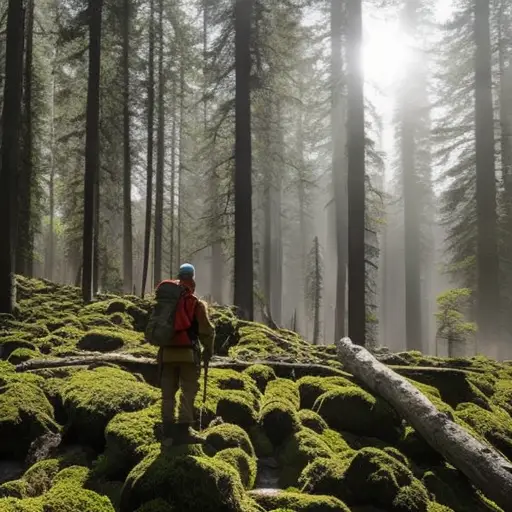Educating Fellow Adventurers on Wilderness Ethics

Imagine a world where every adventurer understands and respects the wilderness they explore. A world where every footstep leaves no trace, every interaction with wildlife is gentle, and every campsite is left as pristine as it was found.
This is the vision we aim to bring to life through the power of education.
In this article, we will delve into the importance of wilderness ethics, explore the principles of Leave No Trace, and provide valuable insights on how to minimize our environmental impact while enjoying the great outdoors.
Let’s embark on a journey of responsible outdoor recreation together.
The Importance of Wilderness Ethics
The preservation of wilderness areas relies on adhering to a set of ethical principles. To ensure the long-term sustainability of these pristine environments, education plays a vital role in promoting sustainable practices. By imparting knowledge and raising awareness about the importance of wilderness ethics, individuals can make informed decisions and take responsible actions.
Education serves as a powerful tool for instilling a sense of responsibility and stewardship towards wilderness areas. It equips individuals with the knowledge to understand the delicate balance of ecosystems and the potential consequences of their actions. By teaching about the fragility and vulnerability of these areas, education fosters a deep appreciation and respect for nature.
Promoting sustainable practices is another key aspect of wilderness ethics education. It encourages individuals to minimize their impact on the environment, such as practicing Leave No Trace principles and respecting wildlife habitats. Education also emphasizes the importance of responsible outdoor recreation, such as staying on designated trails and using eco-friendly camping practices.
Understanding Leave No Trace Principles
To further promote sustainable practices and responsible outdoor recreation, it is essential to delve into the understanding of Leave No Trace principles. These principles provide a framework for individuals to minimize their impact on the environment and preserve the natural beauty of wilderness areas. By following these guidelines, outdoor enthusiasts can ensure that they are practicing good outdoor ethics and contributing to the preservation of our natural resources.
Understanding outdoor ethics and following sustainable practices are crucial for maintaining the integrity of our wilderness areas. Here are three key Leave No Trace principles to keep in mind:
-
Plan ahead and prepare: Proper planning ensures that you are equipped with the necessary knowledge, skills, and equipment to minimize your impact and stay safe in the outdoors.
-
Leave what you find: Preserve the natural environment by leaving rocks, plants, and other natural objects as you found them. This allows others to experience the wilderness in its untouched state.
-
Dispose of waste properly: Pack out all trash and waste, including food scraps and toilet paper. Dispose of them in designated receptacles or by carrying them out with you.
By embracing these Leave No Trace principles, outdoor enthusiasts can minimize their environmental impact and enjoy the wilderness responsibly.
In the next section, we will explore further strategies for reducing our footprint in nature.
Minimizing Your Environmental Impact
When exploring the wilderness, it is crucial to minimize our environmental impact to preserve the natural beauty for future generations.
This can be achieved by following Leave No Trace principles, which include packing out our trash and leaving the area as we found it.
Additionally, it is important to respect and observe wildlife from a distance, ensuring their natural behavior is not disrupted.
Leave No Trace
Minimize your environmental impact by practicing Leave No Trace principles in the wilderness. These principles are essential for ethical camping practices and outdoor etiquette. By following these guidelines, you can ensure that you leave the wilderness as pristine as you found it, preserving its natural beauty for future adventurers to enjoy.
Here are three key principles to keep in mind:
- Dispose of waste properly: Pack out all trash, including food scraps and toilet paper. Leave nothing behind.
- Respect wildlife: Observe animals from a distance, never feed them, and avoid disturbing their natural habitat.
- Stay on designated trails: Avoid trampling vegetation and causing erosion by sticking to established paths.
Pack Out Trash
One important aspect of wilderness ethics is properly disposing of trash to minimize environmental impact. When exploring the great outdoors, it is crucial to practice responsible camping and adhere to the principles of ‘Leave No Trace.’
This means that anything brought into the wilderness should be taken out, including all trash and waste. By packing out trash, adventurers can ensure that the natural beauty of the wilderness remains unspoiled for future generations. It is important to remember that even biodegradable items can take years to decompose in certain environments, so it is best to err on the side of caution and take everything out.
Respect Wildlife
Continuing the discussion on wilderness ethics, it is imperative to demonstrate respect for wildlife in order to minimize our environmental impact. When exploring the wilderness, it is crucial to remember that we are entering the homes of countless species and must act accordingly.
Here are some key ways to show respect for wildlife:
-
Observe from a distance: It is essential to give animals their space. Getting too close can disrupt their natural behavior and cause stress or even aggression.
-
Do not feed or approach: Feeding wildlife can lead to dependency on humans and alter their natural diet. Approaching animals can also pose a threat to their safety and provoke defensive behaviors.
-
Stay on designated trails: By sticking to established paths, we can avoid trampling on sensitive habitats and disturbing wildlife.
Respecting Wildlife and Their Habitat
Respecting wildlife and their habitat is essential when exploring the wilderness. To minimize human-wildlife interactions, it is crucial to maintain a safe distance and observe animals from afar, without disturbing their natural behavior.
Additionally, adhering to the Leave No Trace principles ensures that we leave minimal impact on their habitat, allowing wildlife to thrive undisturbed.
Minimize Human-Wildlife Interactions
To ensure the preservation of wildlife and their habitat, it is imperative for adventurers to actively minimize their interactions with wildlife in wilderness areas. Promoting coexistence and wildlife conservation requires a responsible approach towards these animals and their natural habitats.
Here are a few key steps adventurers can take to minimize human-wildlife interactions:
-
Keep a safe distance: Maintain a respectful distance from wildlife to avoid disturbing their natural behavior and to ensure their safety as well as yours.
-
Avoid feeding wildlife: Feeding wildlife can disrupt their natural foraging patterns and lead to dependency on human food, which can have detrimental effects on their health and survival.
-
Respect wildlife habitats: Be mindful of the habitats wildlife depend on for their survival. Avoid trespassing or damaging their homes and nesting sites.
By following these guidelines, adventurers can promote the coexistence of humans and wildlife in wilderness areas, contributing to wildlife conservation efforts.
Now, let’s move on to the next section about ‘leave no trace’ principles and practices.
Leave No Trace
As we delve further into wilderness ethics, it is important to consider the principle of Leave No Trace, specifically in regards to respecting wildlife and their habitat. Leave No Trace is a set of guidelines that teaches responsibility and encourages adventurers to minimize their impact on the environment.
When it comes to wildlife, it is crucial to remember that we are visitors in their home. By observing from a distance and refraining from approaching or feeding them, we can ensure their safety and preserve their natural behaviors.
Additionally, it is vital to respect their habitat by staying on designated trails and not disturbing their nests or dens. By following these principles, we can contribute to preserving nature’s beauty and fostering a harmonious relationship between humans and wildlife.
Practicing Safe and Considerate Camping
Camping enthusiasts must prioritize safety and consideration in order to preserve the wilderness for future generations. Practicing safe and considerate camping not only ensures your own well-being but also helps protect the natural environment.
Here are some important tips to keep in mind:
-
Choose a suitable campsite: Look for designated camping areas and follow any restrictions or guidelines set by park officials. Avoid fragile ecosystems and sensitive habitats.
-
Follow Leave No Trace principles: Leave No Trace is a set of guidelines that promote responsible camping practices. These principles include packing out all trash, minimizing campfire impact, respecting wildlife, and staying on designated trails.
-
Be mindful of noise and light pollution: Keep noise levels low to avoid disturbing other campers and wildlife. Use minimal lighting at night to reduce light pollution and allow for a more immersive wilderness experience.
By adhering to these principles and practicing responsible camping, you can minimize your impact on the environment and contribute to the sustainability of the wilderness.
Engaging in Responsible Outdoor Recreation
Engaging with the natural environment in a responsible manner is essential for preserving the wilderness for future generations. When it comes to outdoor recreation, responsible hiking and sustainable camping practices play a crucial role in minimizing our impact on the environment.
Responsible hiking involves staying on designated trails, respecting wildlife and their habitats, and leaving no trace behind. It’s important to follow established guidelines and regulations, such as packing out all trash, using biodegradable soaps, and avoiding the disturbance of natural features. By treading lightly and staying on marked paths, we can protect delicate ecosystems and ensure that future generations can enjoy the same pristine wilderness.
Sustainable camping, on the other hand, focuses on leaving the campsite as we found it, if not better. This means properly disposing of waste, using eco-friendly camping equipment, and minimizing campfire impacts. Choosing lightweight and durable gear, using rechargeable batteries, and practicing low-impact cooking techniques are all ways to reduce our environmental footprint.
Engaging in responsible outdoor recreation is not only crucial for preserving the wilderness, but it also allows us to have a more meaningful and enjoyable experience. By being mindful of our actions and making sustainable choices, we can ensure that our adventures do not come at the expense of the natural environment.
Frequently Asked Questions
How Can I Properly Dispose of Human Waste in the Wilderness?
Proper waste disposal in the wilderness is crucial to preserving the environment. Follow Leave No Trace principles by burying feces at least 6-8 inches deep, 200 feet away from water sources, trails, and campsites. Pack out toilet paper and feminine hygiene products.
What Should I Do if I Encounter a Wild Animal While Hiking or Camping?
When encountering a wild animal while hiking or camping, it is important to remain calm and avoid sudden movements. Do not approach the animal, especially if it is a bear. Instead, back away slowly and give the animal space to ensure your safety.
Are There Any Specific Rules or Guidelines for Campfire Safety in the Wilderness?
Campfire safety in the wilderness is crucial to minimize environmental impact and potential risks. Following Leave No Trace principles, ensure a safe distance from flammable objects, use established fire rings, and fully extinguish the fire before leaving.
What Are Some Recommended Ways to Minimize Noise Pollution While Camping?
To minimize noise pollution while camping, it is important to practice Leave No Trace principles and adhere to campsite etiquette. This includes keeping voices at a low volume, avoiding loud activities, and being considerate of other campers’ need for peace and quiet.
Are There Any Regulations Regarding the Use of Motorized Vehicles in Designated Wilderness Areas?
Motorized vehicle restrictions in designated wilderness areas aim to minimize the impact of noise pollution. These regulations vary depending on the specific wilderness area, but generally prohibit the use of motorized vehicles to protect the pristine and natural environment.
Conclusion
In conclusion, it is crucial for adventurers to be aware of and adhere to wilderness ethics in order to preserve the natural beauty and integrity of our wilderness areas.
By understanding and practicing Leave No Trace principles, minimizing environmental impact, respecting wildlife and their habitat, and engaging in responsible outdoor recreation, we can ensure that future generations will be able to enjoy and appreciate these wild spaces.
Let us be the guardians of our wilderness, leaving only footprints and taking only memories.



